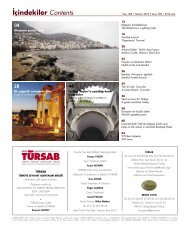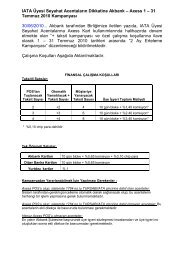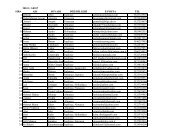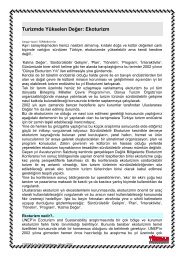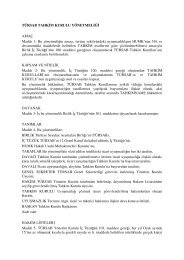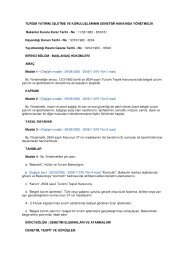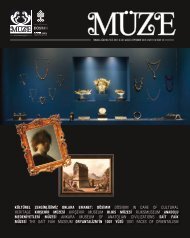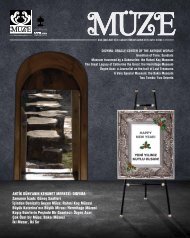Ilgaz Anadolu'nun yüce dağı Ilgaz The sublime - Türkiye Seyahat ...
Ilgaz Anadolu'nun yüce dağı Ilgaz The sublime - Türkiye Seyahat ...
Ilgaz Anadolu'nun yüce dağı Ilgaz The sublime - Türkiye Seyahat ...
You also want an ePaper? Increase the reach of your titles
YUMPU automatically turns print PDFs into web optimized ePapers that Google loves.
ise ‘gezindiği’ kanaatine varmış. Bubilgiler zaman içinde astrolojinintemeli olan ‘gökyüzündeki tanrılar’inancına dönüşmüş.Hayatın gerçeklerini anlamayaçalışan Sümerli rahipler yıldızlarınhareketlerini inceleyerek dev biradım atmış. Yeryüzünde meydanagelen bir olayın, gökyüzündekiyıldızların hareketleri ile aynızamana rastladığını fark etmiş.Dahası, bunun tekrarlandığınıgörmüş.Gökyüzündeki yıldızların hareketi,ay tutulması, Venüs’ün görülmesive yok olması, yeryüzündeki önemliolaylarla birlikte anlam kazanmış.Sonuç elbette ki, sadeceburçlar ya da krala özel bilgiyle‘kehanetler’den ibaret değil.Sümerler’in ilgisi bir yanda tarımıgeliştirdi. Bir yanda da yıldızlarındöngüsüne ilişkin hesaplarlamatematik bilimini yarattı.12 burcun doğumuO döngülerle, Sümerler 18 burçtanoluşan bir ‘zodyak’ yarattı. Babil’inson dönemine damgasını vuran veuygarlık çıtasını yükselten Kaldelilerise bugüne en yakın sistemi ortayaçıkarttı. Zodyak, 18’den 12’yeindirildi. Bu konudaki bilgi veyaklaşımlar ilk kez ‘kayıt altına’alındı. ‘Güneş Burcu’ astrolojisinintemeli atıldı.Bu kadar da değil. Kaldeliler,yarattıkları bu yeni sistemde, herkuşağa öyle isimler verdiler ki,bazıları günümüze kadar kullanıldı:Goat - Oğlak - Capricorn... Lev- Aslan - Lion... Crab - Yengeç -Cancer...Kalde imparatorluğu, Persimparatoru Büyük Kiros’un MÖ39 yılında tahta geçmesi ile sonraerdi. Kalde çöktüğünde bilginlerdünyanın çeşitli yerlerine <strong>dağı</strong>ldı.Bir bölümü eski Mısır’a bir bölümüde Hindistan’a gitti ve astrolojiburalarda da gelişti.Doktorluğun şartıSonraki yüzyıllarda Araplar, bukonuda ciddi katkılarda bulundu.Arap bilim insanları tarafındansayısız kitap yazıldı. Avrupa ise,konuyu, yüzyıllar sonra ama çokhızlı biçimde benimsedi. O kadar kibirçok kral saraylarında astrologlarıgörevlendirdi. Papa’dan başlayarakkardinaller ve büyük din adamlarıastrologlara danışmaya başladı.Astrolojinin böylesine büyük birilgi görmesinin en önemli nedeni,burçların sağlıkla ilgili olduğunainanılmasıydı. Vücutta her organınbir burç tarafından yönetildiğineinanılıyordu. Bu nedenle, o çağlardadoktor olmak isteyen bir kişi tıpfakültesine gitmek istediğindeastroloji eğitimi de almakzorundaydı.Sanayi devrimi ve deyim yerindeyse‘bilgi çağı’ ile birlikte tıp da diğerbilim dalları da astrolojiden arındı.Ancak insanlık burçlara olan ilgisinihiç yitirmedi. Hatta bu ilgi birsektöre dönüştü. Burç uzmanı /astrolog ünvanı taşıyan çok sayıdakişi neredeyse bir ‘otorite’ halinegeldi. Yorumları merak edildi. Omerak da şöhret ve servet getirdi.Ne de olsa, merak, insanımağaradan Mars’a götüren enönemli motivasyon. Gökyüzündekiyıldızlara bakan o ilk insan meraketmeseydi, Babil’deki Zigguratlar’dasabırla yıldızların hareketini izleyen-o çağın- rahipleri merak çıtasınıyükseltmeseydi kimbilir bugünnerelerde olurduk!“wandering”. In the course of time, theseinformation transformed into the beliefin the “gods in the sky”, which was thebasis of astrology.In pursuit of understanding the truthsabout life, Sumerian priests took a giantstep by examining the movements ofstars. <strong>The</strong>y recognized that an eventoccurring on the earth had coincidedwith the movements of the stars in thesky. Furthermore, they realized that thishad been recurring.<strong>The</strong> movements of the stars in the sky,the lunar eclipse, the appearance anddisappearance of the Venus becamemeaningful with the important events onthe earth.Of course, horoscopes or informationand “oracles” shared exclusively withthe kings were not the only outcomes.<strong>The</strong> interest of the Sumerians developedagriculture on one hand, and created thescience of mathematics, thanks to thecalculations about the revolutions of thestars, on the other.<strong>The</strong> birth of the 12 housesUsing those revolutions, Sumerianscreated a “zodiac” consisting of 18houses. Chaldeans, who left their markon the last period of the Babyloniaand who raised the civilization level,developed the system that is the mostsimilar to the current one. <strong>The</strong> numberof houses was reduced to 12 from 18.Information and approaches about thisissue were for the first time “recorded”.<strong>The</strong> foundations of the “Sun Sign”astrology were laid.Furthermore, the Chaldeans gave suchnames to the houses in their new system,that some of them have been used untiltoday: Goat - Capricorn, Lev - Lion, Crab- Cancer. <strong>The</strong> Chaldean Empire ended in539 BC, when the Persian Emperor Cyrusthe Great became the ruler. After thecollapse of Chaldea, the scholars went todifferent parts of the world. Some of themwent to the Ancient Egypt, some others toIndia, and astrology developed in thesecountries too.A requirement for physiciansDuring the following centuries, Arabsgreatly contributed to astrology.Numerous books were written by Arabscholars. Europe adopted astrologycenturies later, but very rapidly. So muchso that astrologers were employed atthe palaces of kings. <strong>The</strong> pope, cardinalsand other high-ranking religious officialsbegan to consult astrologers.<strong>The</strong> most important reason for this greatinterest in astrology was the belief that itwas related to health. It was believed thatevery organ of the body was controlledby a house. <strong>The</strong>refore, in those ages, onewho wanted to attend a medical school inorder to become a physician had to studyastrology as well.Together with the industrial revolution,and, so to say, the “information age”,both medicine and other branchesof science became free of astrology.However, the humanity has never ceasedto be interested in horoscopes. On thecontrary, this interest has created anindustry. Many people who bear thetitles of horoscope expert or astrologerhave almost become “authorities”. <strong>The</strong>irinterpretations have attracted curiosity.And this curiosity brought reputation andfortune. After all, curiosity has been themost important motivation that led thehumanity from the caves to the Mars.Had the first person who looked at thestars in the sky not been curious, had thepriests -of then- who patiently monitoredthe movements of the stars at theziggurats in Babylon not raised the levelof curiosity, who knows, where would betoday!




